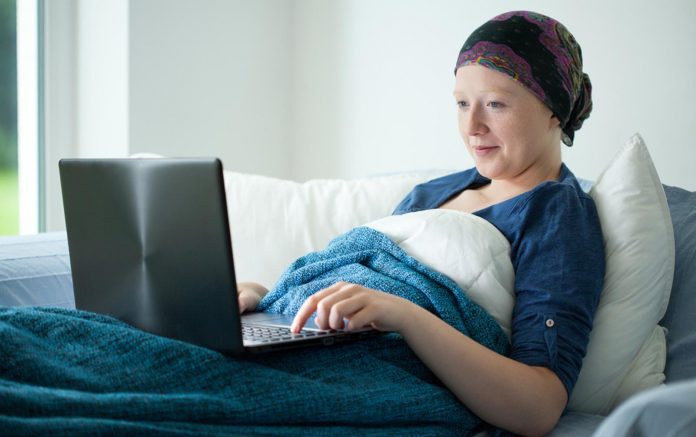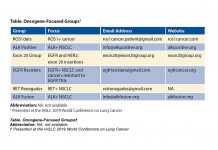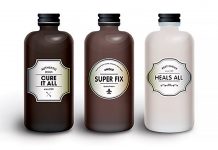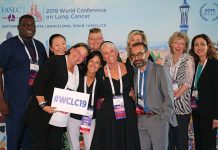By D.R. Camidge
Posted: June 2018
Just as physicians and scientists no longer treat lung cancer as a single disease because of molecular distinctions, patient advocacy groups also are becoming organized along molecular lines.
In 2015, Janet Freeman-Daily, Lisa Goldman, and Tori Tomalia—all ROS1– positive NSCLC survivors—co-founded a private Facebook group, ”ROS1 Positive (ROS1+) Cancer.” They named themselves “The ROS1ders.” Similar Facebook groups now exist for those affected by ALK rearrangements, EGFR mutations, and HER2/EGFR exon 20 mutations (Figure online).
“Facebook has provided an intuitive platform to launch our group, collect initial data from members, and to communicate with members all over the world,” said Ivy Elkins, a 4-year survivor of exon 19 EGFR-mutated NSCLC and one of the seven co-founders of the EGFR Resisters group (egfrcancer.org). “The group began in 2017 after a LUNGevity HOPE summit got us talking about what the options were for treatment if osimertinib stopped working.”
Ms. Freeman-Daily feels that it is key for patients to control the advocacy organizations related to their diseases. She noted that not only can these patient-run groups provide online support and information related to treatment, side effects, and relevant trials, but they also can “drive research directly focused on their disease type by partnering with research labs, clinicians, and industry, as well as other advocacy groups.”
Reaching out to the Bonnie Addario Lung Cancer Foundation, the ROS1ders initially wanted to spearhead the creation of a clinical trial examining treatment options for those patients who experience disease relapse during or after treatment with crizotinib. However, it became clear that there was a lack of knowledge about specific mechanisms of resistance to inform such a trial. “We had to take a step back to identify the real need— one that we, as a group, could actually do something about,” said Ms. Freeman- Daily. Since then, the ROS1ders have developed the methodology to direct standard-of-care biopsies from their members to key academic labs for analysis. In addition, they have started to make patients and their families begin the discussion about the provision of additional tumor tissue through limited postmortem examinations. They have also generated novel ROS1 cell lines through the distribution of collection kits and instructions to distant sites, with live cells successfully returned to academic labs for in vitro culture.
Many of the groups capture detailed information on members. The ROS1ders submitted a poster to the 2018 AACR meeting that describes their projects, including one that compares and contrasts the characteristics of more than 200 patients with ROS1-mutated NSCLC across 21 countries, multiple times the size of the largest previously published series on ROS1-positive NSCLC. Similarly, the EGFR Resisters had a poster at this year’s IASLC Targeted Therapies Meeting, describing the medical details of more than 200 of their members.
Driving Research Through Partnerships
Sometimes starting a group requires outside help. Following his brother Kevin’s diagnosis with Exon 20 EGFR-mutant NSCLC, Bob Hanlon reached out to Marcia Horn at the International Cancer Advocacy Network. Together with Kevin, they developed the Exon 20 Group (exon20group.org) and rapidly assembled a team of what Horn called ‘“all possible stakeholders,” including 121 patients from 20 countries whose tumors harbored EGFR or HER2 exon 20 mutations. Companies such as Takeda, Spectrum, and Rain Therapeutics, which are developing drugs for EGFR and HER2 exon 20 mutant diseases have become partners on the initiative. “We want their trials to address our members’ needs; for example, including cohorts for those patients whose disease did not respond to other drugs directed against exon 20 mutations,” said Ms. Horn.
Some groups are effecting change through financial means. Outreach by the ALK Positive group, which has more than 900 members, has raised nearly $400,000. In 2018, together with LUNGevity, they issued a request for research applications specifically for ALK-related research projects, encouraging applicants to make use of the unique resources offered by such a large and engaged patient group.
Patient groups realize that the three things their members really own—their tissue, medical history, and personal story—can be leveraged to speed up progress in their disease; as a result, partnered research approaches are set to become increasingly common for many specific subsets of lung cancer in the future. ✦











